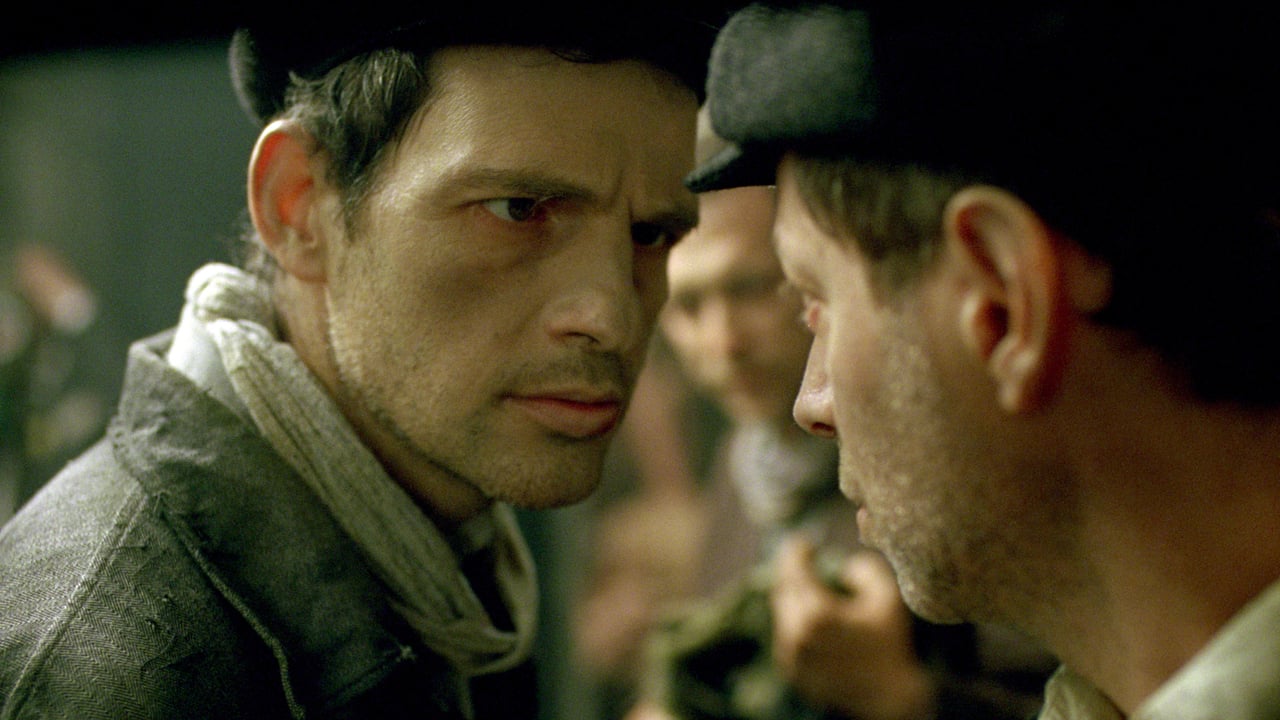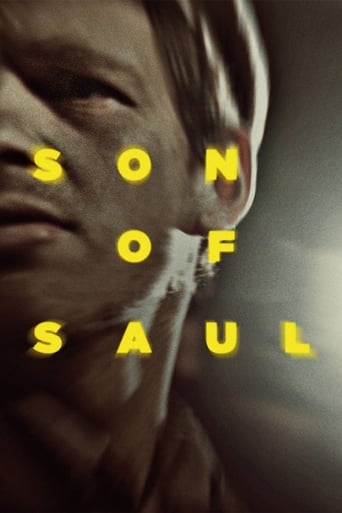

Lack of good storyline.
... View Morejust watch it!
... View Morean ambitious but ultimately ineffective debut endeavor.
... View MoreBy the time the dramatic fireworks start popping off, each one feels earned.
... View MoreMovie is totally painful. First half you feel pain for the victims but after a certain point you start feeling pain for nonsenseness. I tried to feel emphaty with saul but by the movie comes to end it turned some bitter antipathy. If the point was to show his irrationality we can say that it was achived but anyhow it was hard to stand.
... View MoreThe Holocaust perpetrated by Nazi Germany in World War II is a touchy topic for any movie. Numerous documentaries have graphically shown the camps, the aftermath and the tools; writers and visual artists have expounded viscerally and poignantly for over half a century, and for lasting effect; and, of course, Hollywood and others have given us many biographical or fictional narratives to function as vehicles for holocaust commentary.None of the above, in my opinion, comes anywhere near the power of this movie, by first time writer/director, Nemes Laszo. Initially, the movie title intrigued me: Son of Saul. Which biblical Saul? I wondered. The first few minutes resolved that inquiry when it became evident that Saul Ausländer (Geza Röhrig) is one of the Hungarian-Jewish inmates of the camp assigned - as a member of the Sonderkommando i.e. Special Command - to persecute Jewish prisoners by assisting with herding them into gas chambers to their premature, unavoidable death. The irony of Saul's surname here - in English, Foreigner - serves to align this modern Saul with, naturally, Saul of Tarsus, Jewish and Roman citizen, and hence foreigner, who also persecuted the Jews - that is, until he experienced his life-changing epiphany on the road to Damascus.Röhrig the actor is phlegmatic to the point of being automaton, allowing virtually zero emotion on his face while he, as Saul, ritually and repetitively completes his horrific, daily routine of dispensing death to his fellow Jews. The hand-held camera is almost always on his face or the back of his head as we follow him everywhere in the camp, giving us a voyeuristic sense of heightened observation or even quasi-participation - a disturbingly unsettling feeling. Always in the background, and at the edges, the chaotic sights, unbearable sounds and unforgivable sins of the perpetrators while victims are summarily shot, shoved into gas chambers, thrown into fire, bludgeoned and beaten. These are Saul's days, staying alive for as long as he can, while consigning his humanity to the darkest depths of his persona....Until, unexpectedly, he discovers a young boy still alive - just - in the pile of bodies within a gas chamber: an apparent miracle. It's not clear if Saul knows him, or is even related to the boy. But, from that moment, Saul sets out to get the boy away to safety; and in apparent total disregard for his own life or, for that matter, the lives of his Sonderkommando accomplices in criminal anarchy. Thereafter, we continue to follow Saul as he continues his efforts to achieve his goal before he, also, is consigned to the same fate as all other victims.The denouement, when it comes, is realistic, inevitable and expected, I think - despite the dramatic twist the director inserts shortly before. The setting, acting, direction and camera work are simply outstanding. Never before, in all my time watching movies (sixty-five years and counting), have I been as close to a sense of reality as in this effort. There is harrowing, but also uplifting imagery in this story I will never forget.Highly recommended for mature adults and those interested in holocaust history. Nine out of ten.
... View MoreI set myself a target every year to watch every single film that wins and gets nominated at the Oscars, I had watched the other four nominees in the Foreign Language category, I saved this Hungarian film, the winner, until last. Basically set during the Second World War, Hungarian-Jewish Saul Ausländer (Géza Röhrig) is a prisoner in the Nazi extermination camp at Auschwitz, he a member of Sonderkommando, forced under pain of death to aid with the disposal of gas chamber victims. Saul and the other members know that the prisoners they are enclosing in showers are going to their deaths, the members' work consists of disinfecting the gas chamber after use, going through victims' personal possessions to find valuable items, and disposing of the ashes after the bodies have been burned. One of these gassings however sees Saul pulling out the body of a boy he is convinced is his son, the Germans want to perform an autopsy on the body, but Saul manages to steal the body and avoid this happening. Saul wants to give his son's corpse a proper Jewish burial, he is looking for a Jewish rabbi to preside over the burial, he tells other worker prisoners what he is doing in the hope that they will assist him. Saul finds out that many of the worker prisoners are trying to smuggle out information about the atrocities of the camp to show the world, in order to begin an uprising against their captors. The other Sonderkommando members see their task as more important, and there are many moments when Saul may get stalled or caught, including in the indoor and outdoor crowds of other prisoners, but then there comes a point when the usefulness of the working prisoners for the captors may be coming to an end. A riot breaks out, S-S guards are attacked and the rebellion starts, Saul and a group of prisoners are able to escape, he carries the body of his boy, but he is forced to let it go in the current of the river. In the end Saul and the prisoners find a shed in the forest, they rest to discuss a plan to join the Polish resistance, Saul notices a young peasant boy outside, they smile at each other, the boy runs away and guards pass him, in the direction of the shed, gunfire echoes through the woods and the boy walks away. Also starring Levente Molnár as Abraham Warszawski, Urs Rechn as Oberkapo Biederman, Jerzy Walczak as Rabbi Frankel, Sándor Zsótér as Dr. Miklos Nyiszli, Marcin Czarnik as Feigenbaum, and twins Gergö and Balázs Farkas as Saul's Son. It has been seventy years since the events of the Holocaust, Life Is Beautiful and The Boy in the Striped Pyjamas are examples of films that have successful made a fictional but realistic story using a concentration camp, this film proves that there is still room for a new film about this subject. It is simply watching the life of a working prisoner of Auschwitz over a two day period, but what makes this film really clever is that we only see what the character sees, the shocking exterminations and hundreds of people confined and suffering seen from the point of view of the lead character is much more powerful, it is intense and harrowing, but a respectful and magnificent wartime drama. It won the Oscar for Best Foreign Language Film of the Year, it won the BAFTA for Best Film not in the English Language, and it won the Golden Globe for Best Motion Picture - Foreign Language. Very good!
... View MoreI had heard loosely of Sonderkommandos before watching László Nemes's "Saul fia" ("Son of Saul" in English), but the movie takes an unusual approach to it. This is one of the only movies that I've seen in which almost all the focus is literally on one person, with the background blurred. This serves to emphasize the desperation of the protagonist, a Sonderkommando in 1944 Auschwitz, who wishes to give his son a proper burial. Indeed, we see murdered bodies, as well as the atrocities getting committed by the Nazis, but Saul himself is essentially the window into this horrible setting.It's an outstanding movie in every way. While much of the movie may seem slow, it's like this so that the characters can develop. It grows especially intense during the final fifteen to twenty minutes. But the truth is that the whole movie is excellent. It deserved the awards that it won.Another Hungarian movie dealing with the experience of the Jews during this period is 1983's "Jób lázadása" ("The Revolt of Job" in English), about a Hungarian boy adopted by a Jewish couple.
... View More